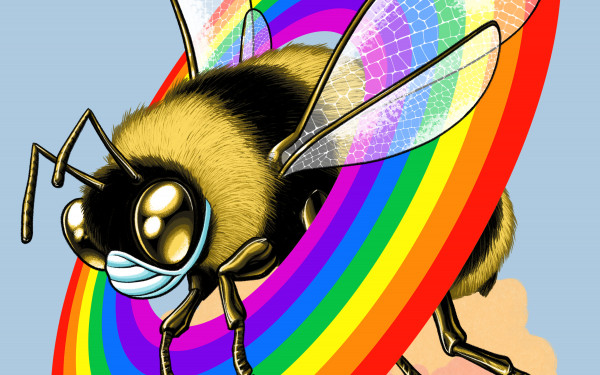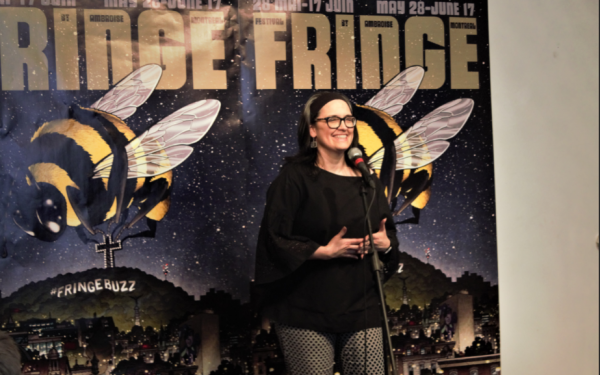Theatre Review: “Bite Your Tongue” with Laughter at the Fringe Fest
Two Concordia Alumni Bring Comedy to the Process of Coming Out
“Bite Your Tongue” opens with a character unleashing a fart at a dinner table.
Two women are sitting at the table facing the audience. They wait for their host Jodie, the cool, smart activist, to show up. “Bite Your Tongue” runs for a half hour, told through the conversation that the two women have at the table. The conversation sometimes takes the form of poetry and monologues, and throughout the play, the characters break the fourth wall.
The play deals with somewhat serious subject matter, but it picks up a humorous and absurdist tone as it goes on. The guests have been left all alone in Jodie’s house. The characters begin the play not knowing what to talk about to each other and end spilling their thoughts, feelings and stories to one another⎯the longer they spend alone, the more they let themselves loose. They dig into the pizza, recite poetry, tell stories, listen to music and dance.
The playwright’s Sue Ee and Ollie Vee had originally intended to write a piece for the Revolution They Wrote festival which led to the birth of this show. They worked on it for another six months before taking it to the Rose Festival, and finally to the Montreal Fringe.
The playwrights’ Sue and Ollie met through Concordia’s theatre program. “Bite Your Tongue” was the first play they wrote together, and individually, their first play that was not written for a class. The characters’ discussions of race, gender, sexuality and community are reflective of the writers’ own experiences.
During the interview, Sue and Ollie explained that throughout their time at university, they’ve been too busy to be involved in social justice and activist work, meanwhile being surrounded by it, and feeling like they are supposed to get involved in some way.
Neither of the playwrights are completely “out”, which is why they are using stage names. They said it was frustrating for them, especially in terms of advertising and promotion, however it gave them material, and fed back into the script.
The play addresses the difficulties that arise with coming out, and what it is like to be in the limbo stage between being closeted and out. Being marginalized always comes with the need to be the best version of yourself⎯the characters experience this on stage, too.
Activist spaces have their own version of this phenomenon. Throughout the play, the characters explore how they navigate the world as queer women who need to navigate their families and communities, all the while managing their multiple marginalized identities.
Sue’s character, Ed, comes from an African country where being homosexual is illegal; Sue explained that the country is not named in the play for the safety of her family. Even in a country where it is illegal to be LGBTQ+, Ed knows that LGBTQ+ people still exist there and hopes to find others like her. She starts by trying to find them through stories told by her family.
Onstage, Ed recites poems that Sue wrote while flying back to Montreal after visiting her family. “The impulse in general to find queerness within your family was something I felt a lot the whole time I was home, any time somebody would mention something that was slightly not heteronormative I would be like ‘tell me more’.”
Sue and Ollie explained that “Bite Your Tongue” was created by a mostly queer cast and crew. With this show, they are hoping to reach young feminist queer people. “Bite Your Tongue” tells a story that will be relatable for everyone who has felt pressure to live up to people’s expectations, particularly as marginalized individuals. The show was enjoyable from start to finish. It is consistently warm, funny, and thoughtful.
Being a person is hard, and being marginalized is even harder. It is easy to compare yourself to the world around you that says you are not normal, but also to compare yourself to people who are better at social justice. The play ends with the characters realizing that, all in all, they’re doing pretty well with what they’ve been given.
You can keep up with Sue and Ollie’s work at “Sort Of Productions” through their Facebook page at https://www.facebook.com/biteyourtongue2018/. For more information about the festival, check out https://montrealfringe.ca/

_600_832_s.png)



